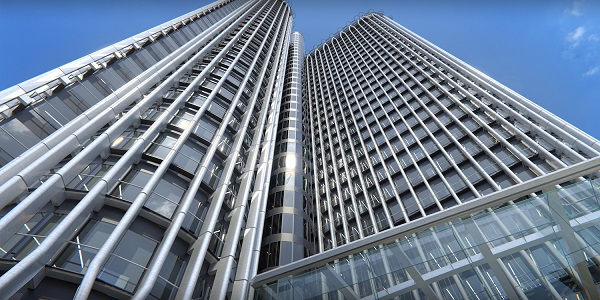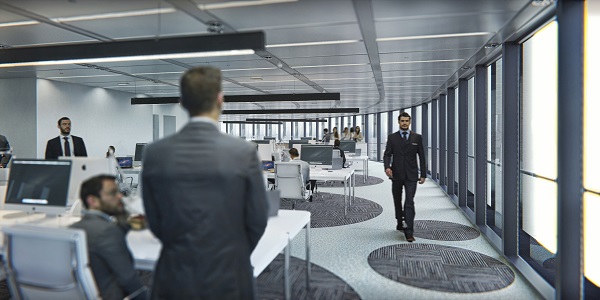Philips Lighting, a global leader in lighting, presented a new connected lighting project that transforms Madrid’s landmark office skyscraper Torre Europa into a smart, highly secure and connected office of the future. This is the first building in Spain to feature a Philips Power over Ethernet (PoE) connected office lighting system to allow office workers to personalize their office environment using their smartphones and building managers to optimize space utilization and building efficiency.
Located at the heart of Madrid’s financial business district, 121 meter high Torre Europa is one of the tallest buildings in the city and a prime location to host the country’s top companies. The building that was originally opened in 1985, has undergone extensive renovation resulting in significant design and technology upgrades both in its exterior and interior. Together with Grupo Infinorsa, majority owner of the property, 14 floors of the 32-floor building have been equipped with 5,400 connected luminaires, covering 19,600 m2 of office space.
 |
|
Philips Lighting brightens up Torre Europa in Madrid, Spain with smart lighting technology. (All photos courtesy of Philips Lighting) |
The Philips connected lighting system enables working environments that respond to users’ specific needs. For increased comfort and productivity, office workers can personalize and adjust light levels and other building services, such as air-conditioning by using a smartphone app.
“Continuous connectivity is transforming the way people interact with information and with each other,” said Josep Martínez, CEO Philips Lighting Spain and Portugal. “Lighting is everywhere and central to the Internet of Things. Sensor rich connected office lighting that is powered by and integrated into the building’s network saves energy and unlocks new levels of productivity and smarter, more flexible ways of working.”
The new lighting system uses Power-over-Ethernet (PoE) to connect the luminaires to the building’s IT network. The system collects, stores, shares and distributes anonymous data acquired by sensors integrated into the luminaires. Information such as room occupancy or temperature can be used to adjust the levels of lighting, heating and air conditioning or for optimizing use of office space as well as scheduling cleaning or maintenance services. Using energy efficient connected LED lighting linked to sensors ensures that lights are switched off when people leave a room. When combined with accurate, real-time data about the Torre Europa building, energy use for lighting can be reduced by up to 70%, which represents an annual reduction of 15 tonnes of CO2 per floor.
 |
|
A man walking in Madrid's landmark office skyscraper Torre Europa lit with new LED smart lights from Philips. |
“Adopting the Philips connected lighting system underlines Infinorsa’s commitment to innovation and is a solid step towards a sustainable working environment, placing Torre Europa at the cutting edge of future offices”, said Fernado Ferrero, Operations Manager at Grupo Infinorsa. “The system’s connectivity is an enabler of the Internet of Things, allowing new forms of integration, collaboration, innovation and socialization between employees, while at the same time increasing the value of this futureproof property.”
Dean Freeman, Research VP Gartner, wrote in a recent Market Guide, where Philips Lighting is listed as a Representative Vendor, that “by 2020, 70% of new commercial building lighting installations will implement smart lighting.1 Fortunately, networked lighting systems with analytics are emerging. Large corporations with multiple campuses are starting to implement Phase 4 (LED Lighting Controls/Sensors Connectivity Analytics). Phase 5 (LED Lighting Controls/Sensors Connectivity Analytics Intelligence) — where algorithms are used to feed back to the system to generate additional energy savings — is rare at the moment; only a few lighting companies have the analytics and algorithm capability in hand.”
1 Gartner Market Guide, Smart lighting by Dean Freeman, August 15, 2016, G00297245
Gartner does not endorse any vendor, product or service depicted in its research publications, and does not advise technology users to select only those vendors with the highest ratings or other designation. Gartner research publications consist of the opinions of Gartner's research organization and should not be construed as statements of fact. Gartner disclaims all warranties, expressed or implied, with respect to this research, including any warranties of merchantability or fitness for a particular purpose.













